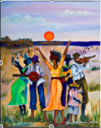During my late high school and college years I drove a Royal Crown Cola truck delivering RC Colas (no moon-pies!) in Beaufort County, South Carolina. My daily routes led me into the backwater areas of the lowcountry. Every Friday I sold drinks on Hilton Head Island. This was back in the days before the island was heavily developed. On the main road and tucked away on dirt roads beyond the paved road on the island were juke joints (small buildings with space for serving drinks, snacks, and dancing) that turned to life in the evenings and weekends for the locals. I was always amazed by the numerous drinks the locals purchased for use in their highly-valued social routines.

It was often difficult communicating with the locals. Many of them spoke a language that was not easy to understand. Over time, I began to understand them and it wasn’t until years later that I realized my work placed me in the midst of a Geechee culture—marked by Gullah cultural legacies. The Gullah people are descendants of West Africans who settled along the coasts of North Carolina, South Carolina, Georgia, and Florida. As of 2005 it was estimated that over a quarter million people fit the Gullah definition, spread over 100 barrier islands on the east coast of the United States. Of course, many today have become mainstreamed into the Americanized way of life.

Our family spent our vacation in Hilton Head, SC last week. While meandering through The Mall at Shelter Cove, I was drawn into De Gullah Creations Store that features unique Gullah handcrafted gifts, art and collectibles, and books from the Gullah tradition. I am a lover of books! I found a book that I did not know existed. It was De Nyew Testament—the New Testament in Gulla Sea Island Creole with marginal text of the King James Version, produced by the American Bible Society in 2005 (www.bibles.com, #119065) for $20. I couldn’t turn it down. I had a case of “long eye†(Geechee way of saying “excessive greedâ€). And I’ve found it hard to put down! It brings a richness to the reading and and experience of scripture that I find alluring. For example…
Jedus Mek de Bline Man See
(Luke 18: 35-43)
Wen Jedus git close ta Jericho, a bline eye man been dey, da seddown side de road, an e beena beg. Wen de bline man yeh the crowd da pass, e aks de people say, “Wa gwine on?â€
Dey tell um, “Jedus fom Nazareth da pass long dis way.â€
Wen de bline man yeh dat, e holla say, “Jedus, Son ob David, hab mussy pon me!â€
De people wa benna lead de crowd buke de man, tell um e mus hush op e mout. Bot de man holla mo louda say, “Son ob David, hab mussy pon me!â€
Jedus stop dey, an e chaage de people fa bring de bline man ta um. Wen e git close ta Jedus, Jedus aks um say, “Wa ya wahn me fa do fa ya?†De bline man ansa say, “Lawd, A wahn fa see gin.â€
Jedus tell de man say, “A da mek ya see. Cause ya bleebe een me, ya done git well!â€
Dat same time de man been able fa see. E folla longside Jedus, da praise God. Wen de crowd shim, dey all praise God too.
I’m going to read this passage of scripture in Gullah as a part of a devotion to senior adults next week. That should prove interesting!
Have you ever heard the Kyrie Eleison pronounced this way: “Jedus, Son ob David, hab mussy pon me!� Rich, huh!?
Hey, don’t let the “monkey†(Gullah for “heat exhaustionâ€) or the Skeeta get you down. Summer’s not quite over and you still may feel a need for a “boneless ham†(a watermelon, used humorously because of the regularity of watermelon in Gullah meals and snacks)!
Check out the 12th Annual Gullah Celebration, February 1-29, 2008 in Hilton Head.
See The Way it Was for an article about the Gullah attempt on Hilton Head Island to hold on to their culture.
Another good place to get a feel for the Gulla legacy in the South Carolina lowcountry is Penn Center. That’s in Frogmore, SC. I delivered drinks to stores in that area too.
A da glad fa see oonah!

